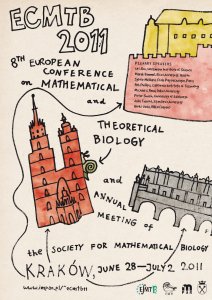- The lectures will be held a day before the Conference start - on Monday, 27-th June - in the afternoon: starting at 14:30.
- The event will take place at the Faculty of Mathematics and Computer Science which is located at the Campus of the 600-Anniversary of the Jagiellonian University's Revival, at the Łojasiewicza street 6 (if you are going to get there on your own, see below).
- Participants will be bussed from the Conference venue (Auditorium Maximum). If you want to take this bus, plese enter your name here or just write to the organizers ecmtb11@impan.pl.
- The buses from Auditorium Maximum leave at 13:55
- After the lectures, the participants will be bussed back to the Auditorium Maximum to register and take part in the welcome reception (at 19:45).
Lectures:
| 14:30 – 15:15 | Stanisław Cebrat:
Sympatric speciation in the changing environment
Evolution of the age structured population has been simulated on a square lattice. Environment has been changed uniformly. Temporarily dispensable genes accumulate deleterious mutations and they could be responsible for elimination of genomes if the environment again calls for their functions, affecting locally the population density. Those fluctuations of population size enable sympatric speciation. |
| 15:20 – 16:05 | Andreas Deutsch: Mathematical modelling of cancer invasion |
| 16:10 – 16:55 | Peter Jagers:
Branching Processes – The Dynamics of Finite Populations
Can a finite population with variation between individuals persist? What is the probability of (rapid) extinction as opposed to long-time stability? What are the conditions for exponential growth? How will a growing population stabilise? Its age-distribution and its composition in general? I shall describe simple and general branching processes and answer such classical questions about growth and extinction of populations, but also hint at modern developments beyond. Prerequisites: basic probability theory. |
| 17:25 – 18:10 | Eva Kisdi:
Mathematical ecology: The need for mechanistic models
Many of the best known models of population dynamics are formulated on a "phenomenological" (meaning more or less ad hoc) basis. I will set forth seven reasons why such models are unsatisfactory and argue that models must be derived from the properties of individuals and the mechanisms of their interactions. Next, I will present a possible mechanistic underpinning to several famous discrete-time population models including the discrete logistic, Beverton-Holt, Ricker, and Hassell models. This talk is based on joint work with Stefan Geritz. |
| 18:15 – 19:00 | Andrea Pugliese: An introduction to current problems in epidemic modelling |
How to get there
Faculty of Mathematics and Computer Science is located at Łojasiewicza street 6. You can get there by a city bus:Get off at the bus stop (see map below):
- "Wydział Zarządzania UJ" (bus line 104)
or
- "Rostworowskiego" (bus line 104, 114, 124, 128, 178, 194, 213, 223, 424, 609)
See big map in a separate window





